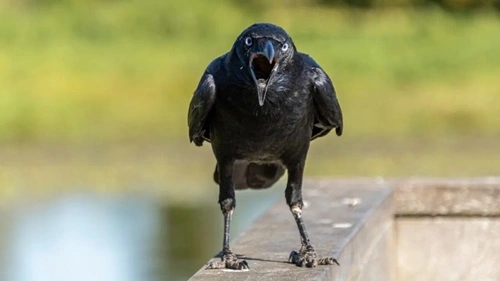Yes, it is illegal to own a crow as a pet in the United States under federal law. Crows are protected under the Migratory Bird Treaty Act (MBTA) of 1918, which makes it unlawful to capture, kill, sell, or possess migratory birds, including their nests or eggs, without a special permit. This law ensures the protection and conservation of native bird species, including crows, across the country.
The Migratory Bird Treaty Act and Its Role
- What Is the MBTA?
- The Migratory Bird Treaty Act is a federal law designed to protect over 1,000 bird species, including crows, from exploitation.
- The law was established in response to declining bird populations caused by hunting, trade, and habitat destruction.
- Why Are Crows Protected?
- Crows are native migratory birds and play a significant ecological role. They contribute to pest control, seed dispersal, and scavenging, which helps maintain ecosystem balance.
- Protecting crows ensures their populations remain stable and that they continue contributing to their natural habitats.
- Prohibited Activities
- Under the MBTA, it is illegal to:
- Capture or trap a crow.
- Keep a crow as a pet.
- Sell or trade crows.
- Possess a crow, its feathers, eggs, or nest without a valid permit.
- Under the MBTA, it is illegal to:
Permits and Exceptions
- Rehabilitation Permits
- Wildlife rehabilitators can obtain special permits to care for injured or orphaned crows temporarily. However, these birds must be released back into the wild once they recover.
- Long-term captivity is only permitted if the bird cannot survive in the wild due to injury or other factors.
- Scientific and Educational Permits
- Researchers, educators, or conservation organizations may apply for permits to study or use crows for specific scientific or educational purposes.
- These permits are strictly regulated and granted on a case-by-case basis.
- State-Specific Rules
- In addition to federal laws, many states have their own regulations protecting crows, which may further restrict ownership or interaction with these birds.
Why Keeping a Crow Is Problematic?
- Wild Animal Behavior
- Crows are highly intelligent and social birds that thrive in their natural environment. Captivity deprives them of the space, freedom, and social interactions they need.
- Keeping a crow as a pet often results in stress, behavioral issues, and reduced quality of life for the bird.
- Health Risks
- Wild crows can carry diseases, parasites, or pathogens that may pose risks to humans or other pets.
- Improper care or housing can lead to health problems for both the bird and the owner.
- Ecological Impact
- Removing crows from their natural environment disrupts local ecosystems, as crows play a crucial role in controlling insect populations and cleaning up carrion.
- Legal and Financial Consequences
- Owning a crow without a permit can result in hefty fines, penalties, or even criminal charges under federal and state laws.
Legal Consequences
- Fines and Penalties
- Violating the MBTA can result in fines of up to $15,000 per offense and up to six months in jail. Repeat offenses may carry harsher penalties.
- Confiscation
- Law enforcement or wildlife officials may confiscate the crow and transfer it to a licensed rehabilitator or conservation organization.
- Additional State Penalties
- States with stricter wildlife laws may impose additional fines or penalties for unauthorized possession of a crow.
Related FAQs
Q1. Can I keep a crow if I find it injured?
Ans: No, you cannot keep an injured crow without a permit. Contact a licensed wildlife rehabilitator for assistance.
Q2. Are there any legal alternatives to owning a crow?
Ans: Yes, you can support crows by creating a bird-friendly environment in your yard with native plants, water sources, and proper feeding practices.
Q3. Are all crows protected under the MBTA?
Ans: Yes, all native crow species, including the American crow and fish crow, are protected under the MBTA.
Q4. Can I own a crow with a permit?
Ans: Only specific permits for scientific, educational, or rehabilitation purposes allow the possession of a crow. Keeping a crow as a pet is not permitted.
Q5. Are there other birds I can legally own as pets?
Ans: Yes, domesticated bird species like parrots, canaries, and finches can be legally owned as pets, as they are not protected under the MBTA.
Conclusion
Owning a crow is illegal in the United States due to their protection under the Migratory Bird Treaty Act. These intelligent and ecologically vital birds are best left in the wild, where they can thrive and contribute to their natural environment. For those interested in crows, observing them in the wild or supporting conservation efforts provides a legal and ethical way to appreciate these fascinating birds.


